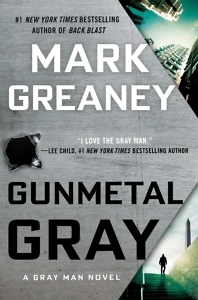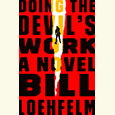A Thriller for Our Times
Cyber warfare gets physical for Mark Greaney’s Gray Man

The spy thriller Gunmetal Gray, the sixth book in Mark Greaney’s expertly crafted Gray Man series, is a nonstop barrage of action, but it may not qualify as escapist fare.
A story about government spies fighting opposing government spies to dominate cyberspace no longer seems like remote fiction in an atmosphere saturated by CIA and FBI reports that Russian computer hackers targeted our presidential election. In a 2014 interview that now appears prophetic, Greaney called Vladimir Putin the “greatest threat” to U.S. security: “Putin is … a loose cannon whose self-interest involves working against us for many reasons.”
Greaney is the Memphis-based writer who was Tom Clancy’s co-author on three novels in the Jack Ryan espionage series, and since Clancy’s death in 2013, he’s produced four more Ryan books. His solo series debuted in 2009 with The Gray Man, introducing Court Gentry, a one-time CIA agent turned CIA assassination target, who is once again working for the CIA in Gunmetal Gray.
Here, the struggle for cyber supremacy is brutally fought with real weapons wielded by agents from China, Russia, and our man from the U.S., along with a supporting cast of police and gangsters from Vietnam and Thailand. The object of the horde of mostly sinister pursuers is to kidnap or kill one computer nerd: a twenty-six-year-old Chinese computer security expert who escapes his minders after living most of his adult life in front of a screen in a protected compound.
 Court is famed in the espionage underworld as a virtuoso killer-for-hire, a loner who manages to disappear in plain sight. In Gunmetal, a Russian agent watching him at an empty bar in midday on a small Hong Kong island realizes she probably wouldn’t recognize him if she saw him again. “This son of a bitch was that good,” she says to herself.
Court is famed in the espionage underworld as a virtuoso killer-for-hire, a loner who manages to disappear in plain sight. In Gunmetal, a Russian agent watching him at an empty bar in midday on a small Hong Kong island realizes she probably wouldn’t recognize him if she saw him again. “This son of a bitch was that good,” she says to herself.
But when Court returns to that bar at night, he does stand out as the only white man in a room crowded with members of a Triad branch, a real-life crime organization that ranges across territory including China, Hong Kong, Taiwan, and Vietnam. With knife, gun, and fire, Court takes on fifty of the gangsters in the kind of absurdly believable brawl that Greaney orchestrates masterfully.
Greaney’s books are hefty, but few words are wasted, a style that suits his protagonist well. If Court looks out a window, it’s not an excuse for idle scene-setting. The reader learns later that he was assessing whether a fall from a hotel room would be far enough to kill a victim, for instance, or he’s memorizing details of a skyline to determine his location after kidnappers remove the hood they used to transport him.
Court’s interior monologue is distinguished by a dry sense of humor, though it’s always in practical service to the plot. When he observes that the shabby aforementioned bar looked as if it had been built in a day by Boy Scouts “rushing through the obligations of their woodworking badges,” he’s storing facts for future use. A few chapters later, he’ll remember that he can create his own exit by kicking out a flimsy wall.
Because Greaney, who has trained in military and law-enforcement firearms and tactics, is adept at his research, one of the pleasures of reading these books is imagining that Court’s extreme feats might be doable. As the author once said in an interview with The Commercial Appeal in Memphis, “I have this credo that I don’t have to be able to do it, but if one person in the world can pull it off, then I can write about it.”

Peggy Burch was books editor at The Commercial Appeal in Memphis for ten years, and she also worked as a deputy metro editor and Arts & Entertainment editor for the newspaper. She is a graduate of the Newhouse School of Public Communications at Syracuse University and holds a master’s degree in English literature from the University of Mississippi.


